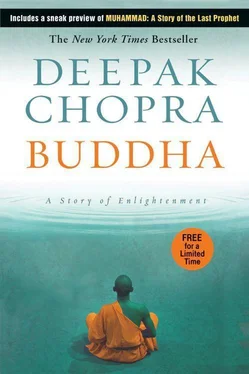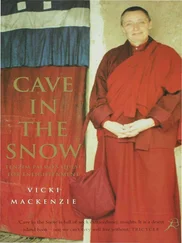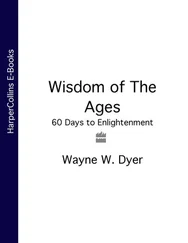The new Buddha arose, adjusted his saffron robe, and began walking toward the road, the same as on a thousand other days. Once he reached the road, he found it completely empty, even though the time was early morning, when farmers’ carts should have been trundling to market. The emptiness seemed even odder after hours had passed and still he hadn’t met a single wagon or foot traveler.
Buddha could be completely alone in the world. Why not? It was his world to do with as he pleased. He was the one dreaming it. Some skittish parrots overhead burst into flight as Buddha laughed out loud. This was outrageous! If a king ruled the world, he would run wild. He would tear it to shreds in anger, toy with it, wrap his body in its sensual delights.
Instead, he possessed the world as Buddha, so none of those possibilities came true. His powers flowed from the other side of silence, where the mind can make anything happen. For a little while the new Buddha enjoyed himself, pulling the sun through the sky like a toy cart, swirling the winds around the poles, shedding rain on a parched desert. This private diversion didn’t last long. Buddha’s world should have people in it whom he could care for. He recalled what Canki had said about a Golden Age-an age without suffering, where abundance was normal and scarcity forgotten in the dim past.
At that moment his vision was shattered by a scream. He saw a woman running toward him, her sari torn to shreds, her arms bleeding. In her panic the woman was blind to Buddha’s existence until she was nearly upon him. Then her eyes registered him standing there, still and calm.
With a cry she rushed to throw herself into his arms, overwhelmed with relief. When she was two steps away, he held his hand up in blessing. The woman stopped in her tracks. She quivered with terror, her breast heaving.
“No more fear,” Buddha whispered. “Give it to me.”
She dropped to the road as if her body had melted and began to weep.
“All,” said Buddha. “Give it all to me.”
The woman became very still; the crying had stopped. Buddha erased the images of terror from her mind. He saw a knife. Teeth like fangs. A necklace made of severed fingers. The images were nightmarish. With the slightest touch, he made them vanish. But one image wouldn’t melt away-the body of her dead husband. He lay in the dust of the road, his throat slashed.
The woman was touching Buddha’s feet now in supplication. Something inside her knew who he was. She gazed at him through her eyes and said, “Please.”
Buddha stopped himself from consoling her. He lifted the woman’s head and met her gaze. “It is done,” he said. She shuddered and fainted. After a moment, as Buddha stood motionless, a man rounded the corner driving an ox cart. Her husband. Buddha gestured for him to approach, and he sped up. Seeing his wife on the ground, the husband jumped down in alarm.
“What happened?” he cried.
“It will be all right. Let’s put her in the cart.” The two of them gently laid her in the straw behind the driver’s seat. The husband had some fresh water in a goatskin bag; he wanted to splash it on her to reassure himself that she was all right. Buddha stopped his hand. “Let her wake up on her own. She may be surprised to see you, but calm her with loving words. You understand?”
The farmer nodded. By imagining the farmer alive and well again, he had erased the whole attack. It wasn’t difficult. He hadn’t raised the husband from the dead. All he did was say no softly to himself. The event he refused to accept no longer existed. Buddha smiled at the husband, and when he had nothing more to say, the farmer thanked him and left.
Power over time and fate. Buddha mused on this as he walked. Does a Buddha reverse every harm? Even if he had that power, did he have the right to change karma on a whim?
In a short while he saw the first huts of a small village. As he approached, people came out wearing suspicious and fearful looks. Some carried pitchforks and rusty swords. They glared as Buddha passed, and in each mind he heard the same word: Angulimala. He soon realized that this was the name of someone they all feared. A killer. A madman. A monster.
Buddha continued to the local temple, whose tiled roof was the highest point in the village. In the shadowy cool of the inner sanctum he saw an old priest cleaning the altar of faded flowers and burnt incense ashes. He approached.
“Namaste.”
The priest barely acknowledged him. Remote as this temple was, he maintained the air of a Brahmin. Instead of praying beside him, Buddha sat cross-legged before the altar and waited. The old priest threw a few fresh flowers onto the Shiva statue and turned to leave.
“Angulimala,” Buddha said.
The priest got angry. “Don’t say such a thing. This is a holy place.”
Buddha said, “I think you forbid the name of Angulimala because you fear he might hear and invade your kingdom.” The old priest squinted his eyes, wondering if he was being mocked. “I can help,” Buddha added.
This offer was greeted with a harsh laugh. “How? Are you a warrior monk? It wouldn’t matter. Angulimala has killed his share of warriors. He has powers. He exchanged his soul for them.”
“What powers?”
“He can outrun a horse. He can hide without being seen and spring down on travelers from the tops of trees. Enough?”
“Perhaps, if any are true. I doubt that these powers have been observed if he kills everyone he meets and the few survivors are terrified,” said Buddha.
The priest, who was bald and slightly hunched, relented slightly. “You’re right about that, stranger. Come with me. I can feed you, and with a little food in your stomach you might stop deluding yourself that you can help.” The old priest managed a tight smile; something deep inside had been touched by the stranger’s offer. They retired to the temple kitchen, and when the stranger’s bowl was filled with rice and lentils, the two sat outside in the shade to eat.
“As you know, anguli means fingers,” said the priest. “To terrify everyone the more, this killer collects the fingers of his victims and wears them as a necklace around his throat. Very few know his real story, but I am one. The monster began life as the mild son of a Brahmin family with no money. At fourteen he was sent to school in a nearby village, with the hope that once he was educated he could perform rites at the temple and restore his family’s fortunes.
“But the Brahmin who ran the school was of unbalanced mind. He accused the boy of sleeping with his wife and threw him out in disgrace.” Buddha didn’t detect much pity for suffering in the old priest’s heart, but he genuinely felt sorry for the wronged boy.
“The scandal reached home before the boy did. When he crossed the threshold, his father beat him brutally and threw him out to fend for himself. The family’s hopes for restoring their fortunes were dashed. It didn’t matter that their son was innocent.”
As the priest recounted the tale, Buddha could see every event in his mind. What lay ahead looked much darker. “There was nothing for him to live for but death,” Buddha murmured.
“He was born cursed, and there’s no hope for him,” the old priest said severely.
“Did anyone try to give him hope?” asked Buddha. The priest scowled, but their meal was over. In gratitude, Buddha bowed his head. He didn’t prostrate himself at the Brahmin’s feet. This caused the old priest to keep a moody silence as he escorted his visitor to the gate.
“You’re a fool to go after him. I can see that’s what you have in mind,” the Brahmin said. “But if you must, here’s a charm to protect you.” He held out some dried herbs bundled with a prayer scribbled on a leaf. Buddha accepted it.
Читать дальше












